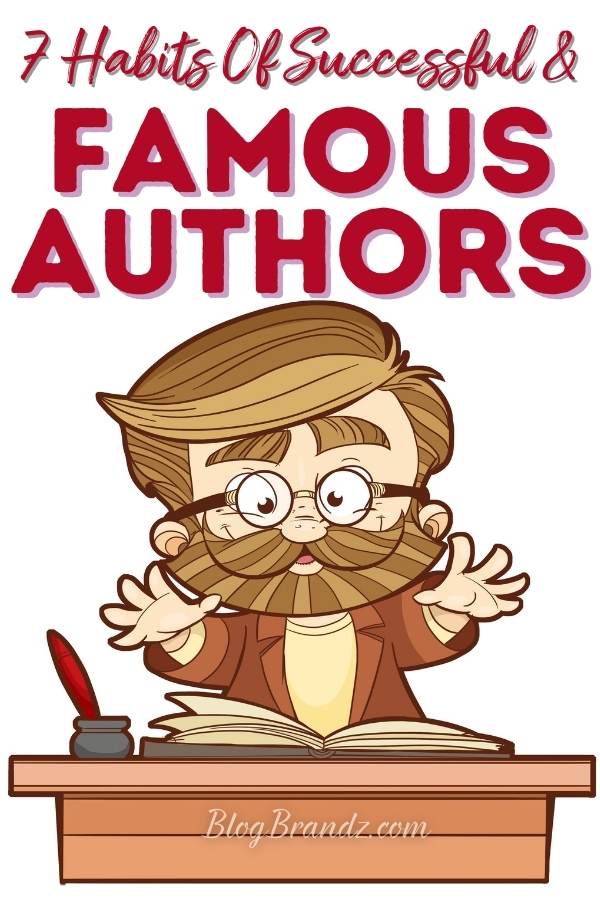Many book authors and writers dream of becoming famous authors. To become a successful writer, adopt these 7 habits of the most successful book authors.
The more I read about how successful authors do it, the more I realize that, like successful people in all walks of life, they all have some things in common that contribute enormously to their success.
Contents
7 Habits Of The Most Successful Book Authors
How can we learn from successful and famous authors to ensure we become successful authors too? We can start by adopting these 7 habits of highly successful and famous authors.
If you adopt these 7 habits, you’ll break through writer’s block and overcome your own writing barriers to become the writer you were meant to be.
#1. Write about something you care about
Successful and famous authors usually have an emotional connection to their content or stories. Whether you’re writing fiction or non-fiction, it is imperative that you write about something you care about.
If you’re writing fiction, then write from a place of emotional familiarity. Your genuine experience will come through in your writing and your readers will connect with that.
If you are writing a non-fiction book, choose a topic you’re passionate about or enthusiastic about. After all, if you’re going to invest your precious time in writing your masterpiece, you owe it to yourself to write with passion, feeling, and enthusiasm.
#2. Don’t be afraid to take risks
Don’t be afraid to put your head, or your hands, on the chopping block when you write. In the world of fiction, you’ll no doubt have heard about creating characters that are larger than life.
That doesn’t mean they’re giants, it just means that they go above and beyond and take risks and make decisions that we would not have the courage to take in our own lives.
After all, being a writer is not about what we would do when we’re tethered by the restrictions of polite behaviour, it’s what we would do in our wildest imaginations that make our readers sit up and take notice.
For the non-fiction writer, it’s time for you to take a stand. Take a view and stick with it, presenting your case with conviction and vigour. No one listens to someone who writes meekly, or with a wishy-washy hand. Stick your neck out, and don’t be afraid to get it chopped off.
The best authors of all time are the ones who were not afraid to speak their minds. Get into that habit and you’ll be well on your way to being one of the best authors of the 21st century.
#3. Plan your book
Whether you’re a plotter or a pantser, planning is essential to the success of any undertaking and writing is no different. It is definitely the most underrated, but equally the most important, phase of the writing process.
Harry Potter writer, J.K. Rowling, spent 5 years planning the entire Harry Potter series before she put pen to paper on a single word that appeared in the books.
Whether you want to start with short story writing, become a novelist or write a screenplay, planning the story before you begin writing is as essential to your success as ink in your pen or power to your laptop.
There are some writers who claim they can just start with an image or a sentence and then the whole thing just unfolds before them, but the writers who can do this with any degree of success are few and far between.
Even the best writer in the world will experience writer’s block from time to time and taking the time to plan out your story, will at the very least, help you know where your beginning, middle, and end are.
The more planning you do, the more enjoyable the creative process of writing becomes and the less rewriting and editing you’ll have to do.
The same goes for non-fiction books, where it’s always advisable to start writing down the bones, so you have an outline in place before you start the writing process.
#4. Write every day
Writing is a muscle that every writer needs to build and just as muscles need to be exercised to become stronger, so must a writer write something every day, no matter how short or how long.
“Exercise the writing muscle every day, even if it is only a letter, notes, a title list, a character sketch, a journal entry. Writers are like dancers, like athletes. Without that exercise, the muscles seize up.” ~ Jane Yolen
Joyce Carol Oates said that she would write, even when her soul felt as thin as a playing card because somehow the act of writing would set it alright.
There are going to be times when you just don’t feel like it, but like any other job or activity that’s important to you, you must still, somehow, sit down every day and write something.
It’s been said that it is by sitting down every day to write that one becomes a writer. Stephen King believes in writing every day, including on Christmas Day, and he aims to write for about four hours each day and get down to about 1,000 words.
So whether you’re writing a novel, a short story, an article, or nothing in particular, just sit down and write something every single day. You could even write your own story in a journal or diary.
In her book, The Artist’s Way, Julia Cameron recommends doing Morning Pages – three pages of longhand, stream-of-consciousness writing, done first thing in the morning – as the bedrock tool of creative recovery.
There are many writing tools, book writing apps, and creative writing software that will help you kick-start your creativity and get rid of writer’s block.
Another way to find creative inspiration to write is to attend a writer’s retreat, writer’s workshop, or online writing classes. Even if you only write one page every day, that’s 365 pages in a year and that’s a whole book, isn’t it?
When you’re a writer, writing is like breathing. You have an urge to put things down in print and to keep that fresh and alive, you need to turn on that tap every day.
It’s more than practice. It’s life!
#5. Be prepared to do the work
Writing is work, there’s no doubt about that, and the most successful writers and famous authors are the ones who were willing to do the work.
It’s said that John Grisham worked for 4 hours per day and made $20 million per year. Whether that is true or not (about the hours worked or the money he makes) doesn’t matter.
It is far more common to hear tales of the world’s most famous authors today who work their proverbial butts off to keep up with deadlines, promotional commitments, and the ins and outs of their everyday lives.
Janet Evanovich gets up and writes every morning at 5 a.m. so she can get a full day’s writing in before she has to answer mail, and emails and deal with her other affairs of the business.
Jodi Picoult has a wonderful stay-at-home husband who allows her the luxury of writing through school pick-ups and traveling for long periods to do research for her novels.
J.K. Rowling also said she (misguidedly) thought that life as an author would be a Jane Austen-type of affair – sitting in a room overlooking a field and writing in anonymity.
Instead, her life is a whirlwind of book launches, movie premieres, media commitments, school commitments, and of course, she has a family with three children.
And while we all no doubt wish we had her ‘problems,’ it’s very obvious that in the early part of the 21st century, the life of an author, successful or not, is a hard-working life.
You’re either working hard to get noticed, working hard to stay noticed, or working hard to avoid being noticed. Any way you look at it, if you have an aversion to hard work, you need to look elsewhere. Successful authors work hard and hone their craft. Period.
#6. Persistence pays
It’s said that persistence outstrips all other virtues. As American author, William Feather famously said, “Success seems to be largely a matter of hanging on after others have let go.”
Success seems to be largely a matter of hanging on after others have let go. ~ William Feather
Almost every successful and famous author has said that their success is due, at least in some part, to pure persistence and determination.
If your manuscript is rejected, rewrite it and submit it again. Or submit it to someone else. The first Harry Potter novel was rejected by every major publishing house before Bloomsbury picked it up for a song.
Even so-called “overnight successes” have a story behind them about how many times they were rejected, or how many novels or articles they’ve written that have no value other than as fire kindling.
The book writers who plodded on and succeeded in becoming famous authors today are the ones who didn’t stop until they achieved what they set out to do.
So, never give up. It’s that simple!
#7. Let it go
And finally, when you’ve written your book or screenplay and have submitted it for publication or approval, let it go. If you’ve done the best you can with it, trust that it will make its way to where it needs to be.
And start something else straight away. Regardless of whether your submission is accepted or rejected, you’re a writer and a writer writes. After you finish one manuscript, get started on another.
If the one you’ve sent is picked up, they’ll be happy you’ve got something new already, and if not, you’ll already be well on your way to finishing your next manuscript.
Adopt these 7 habits of the most successful and famous authors yourself, and before long, you too will join their ranks!
Book writing & publishing tips
- Free creative writing software & online writing tools
- 10 emotional self-care practices for writers & creatives
- How to start writing a book for beginners
- Learn how to write a book with free book writing classes
- How to write a bestseller and become a bestselling writer
- Best creative writing Masterclasses by Masterclass authors
- How to learn creative writing skills and be a better writer
- How to learn lucid dreaming for creativity & personal growth
- 7 tips for overcoming and dealing with writer’s block
- How to write the perfect nonfiction book proposal that sells
- 16 types of writing skills and how to learn them
© 2022 – 2024, Priya Florence Shah. All rights reserved.
Priya Florence Shah is a bestselling author and an award-winning blogger. Check out Devi2Diva, her book on emotional self-care for women. In her spare time, Priya writes science-fiction novels and poetry and chills with her two-legged and four-legged kids.
Discover more from Business & Branding Tips
Subscribe to get the latest posts sent to your email.











